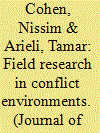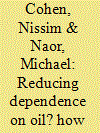|
|
|
Sort Order |
|
|
|
Items / Page
|
|
|
|
|
|
|
| Srl | Item |
| 1 |
ID:
109909


|
|
|
|
|
| Publication |
2011.
|
| Summary/Abstract |
Conducting research in conflict environments is a challenge, given their complexity and common attitudes of distrust and suspicion. Yet, conflict and methodology are usually analyzed as separate fields of interest. Methodological aspects of field work in conflict environments have not been systematically analyzed. This article addresses the central methodological problems of research conducted in conflict environments. We suggest the use of the snowball sampling method (hereafter, SSM) as an answer to these challenges. The effectiveness of this method has been recognized as significant in a variety of cases, mainly regarding marginalized populations. We claim that in conflict environments, the entire population is marginalized to some degree, making it 'hidden' from and 'hard to reach' for the outsider researcher. The marginalization explains why it is difficult to locate, access and enlist the cooperation of the research populations, which in a non-conflict context would not have been difficult to do. SSM directly addresses the fears and mistrust common to the conflict environment and increases the likelihood of trusting the researcher by introduction through a trusted social network. We demonstrate how careful use of SSM as a 'second best' but still valuable methodology can help generate cooperation. Therefore, the evaluation of SSM, its advantages and limitations in implementation in conflict environments can be an important contribution to the methodological training of researchers. In addition to its effectiveness under conditions of conflict, SSM may, in some cases, actually make the difference between research conducted under constrained conditions and research not conducted at all. Together with our experiences in the field, we supply several insights and recommendations for optimizing the use of SSM in a conflict environment.
|
|
|
|
|
|
|
|
|
|
|
|
|
|
|
|
| 2 |
ID:
107915


|
|
|
|
|
| Publication |
2011.
|
| Summary/Abstract |
This article provides data and insights into Israeli public opinion about the welfare state and social policy. The study included 940 respondents who reported their attitudes towards various issues related to the welfare state. The study was conducted in spring 2008 prior to the current economic crisis. The findings show that, to a large extent, the Israeli public justifies state intervention in the supply of public services, supports public investment in services related to the welfare state, and recognizes the obligation to support those in need. As for various policy areas, the Israeli public regards education as a top priority, believing that investment in public education is likely to lead to achievements in other areas such as security and health. However, when asked about their willingness to pay more taxes for services related to the welfare state, respondents tended to be less enthusiastic. The research points to a significant gap between the social and economic policies in the past decade and the attitudes of large parts of Israeli society towards the welfare state. We provide possible explanations for that gap.
|
|
|
|
|
|
|
|
|
|
|
|
|
|
|
|
| 3 |
ID:
121314


|
|
|
|
|
| Publication |
2013.
|
| Summary/Abstract |
Policy entrepreneurs are individuals who exploit an opportunity in order to influence political results for their own benefit. We use the policy entrepreneurship literature as a theoretical lens for understanding how local players in the policy arena can use a national security agenda in order to promote an energy policy they desire. Using a case study approach, we explain how an Israeli electric vehicle company, Better Place, identified Israel's acute national security priority to cut its dependence on oil and leveraged it, along with environmental arguments, to make the case for their approach to transportation. Our analysis also demonstrates how policy entrepreneurs collaborate with Israeli bureaucrats, senior politicians and lobbying groups to create a national shift toward electric cars.
|
|
|
|
|
|
|
|
|
|
|
|
|
|
|
|
|
|
|
|
|